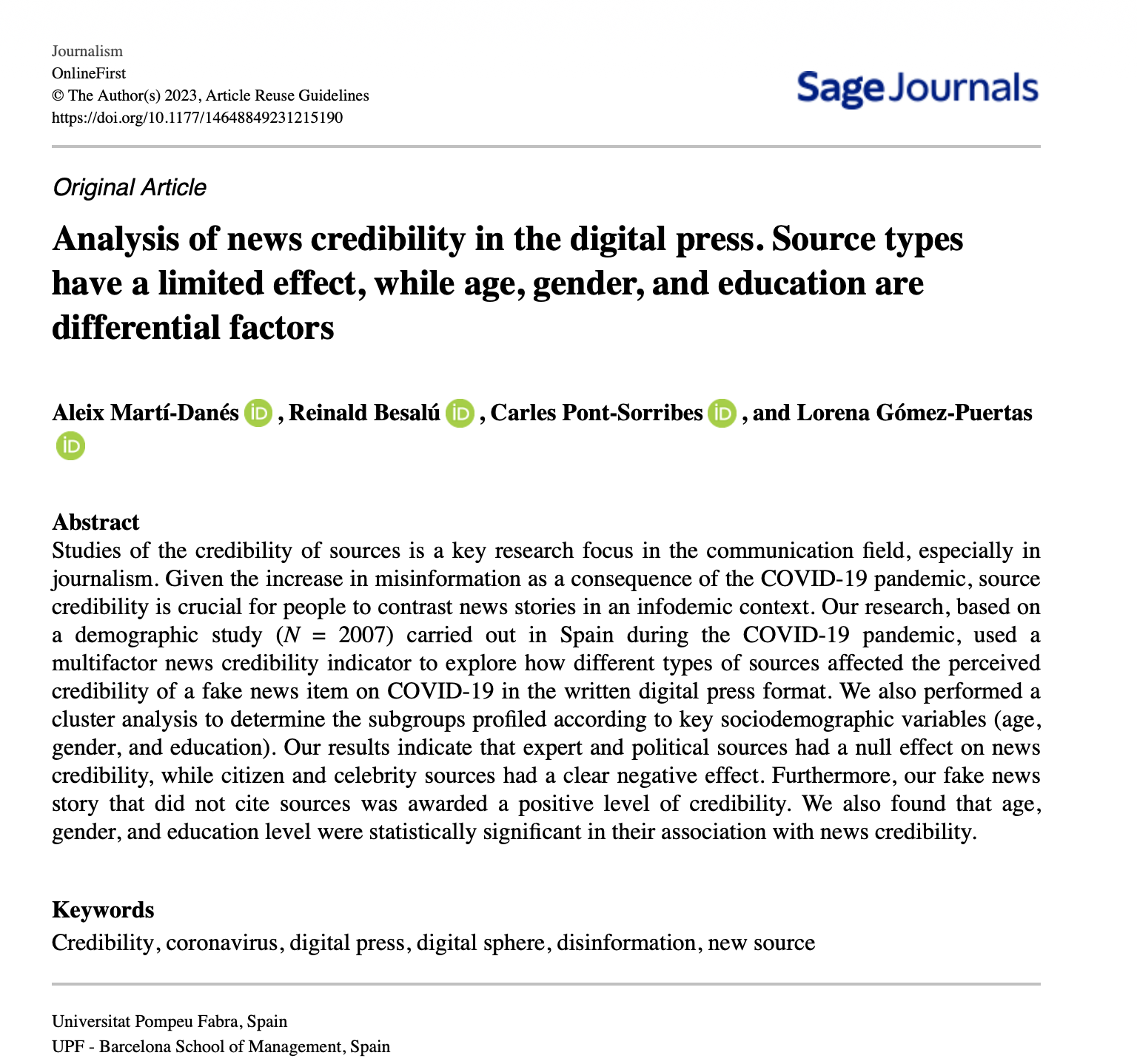Articles
Analysis of news credibility in the digital press. Source types have a limited effect, while age, gender, and education are differential factors (2023)
Abstract: Studies of the credibility of sources is a key research focus in the communication field, especially in journalism. Given the increase in misinformation as a consequence of the COVID-19 pandemic, source credibility is crucial for people to contrast news stories in an infodemic context. Our research, based on a demographic study (N = 2007) carried out in Spain during the COVID-19 pandemic, used a multifactor news credibility indicator to explore how different types of sources affected the perceived credibility of a fake news item on COVID-19 in the written digital press format. We also performed a cluster analysis to determine the subgroups profiled according to key sociodemographic variables (age, gender, and education). Our results indicate that expert and political sources had a null effect on news credibility, while citizen and celebrity sources had a clear negative effect. Furthermore, our fake news story that did not cite sources was awarded a positive level of credibility. We also found that age, gender, and education level were statistically significant in their association with news credibility.
Com citar:
Martí-Danés, A., Besalú, R., Pont-Sorribes, C., & Gómez-Puertas, L. (2023). Analysis of news credibility in the digital press. Source types have a limited effect, while age, gender, and education are differential factors. Journalism, 0(0). https://doi.org/10.1177/14648849231215190
Perceived Credibility of Tweets by Opinion Leaders During the COVID-19 Pandemic in Spain (2021)
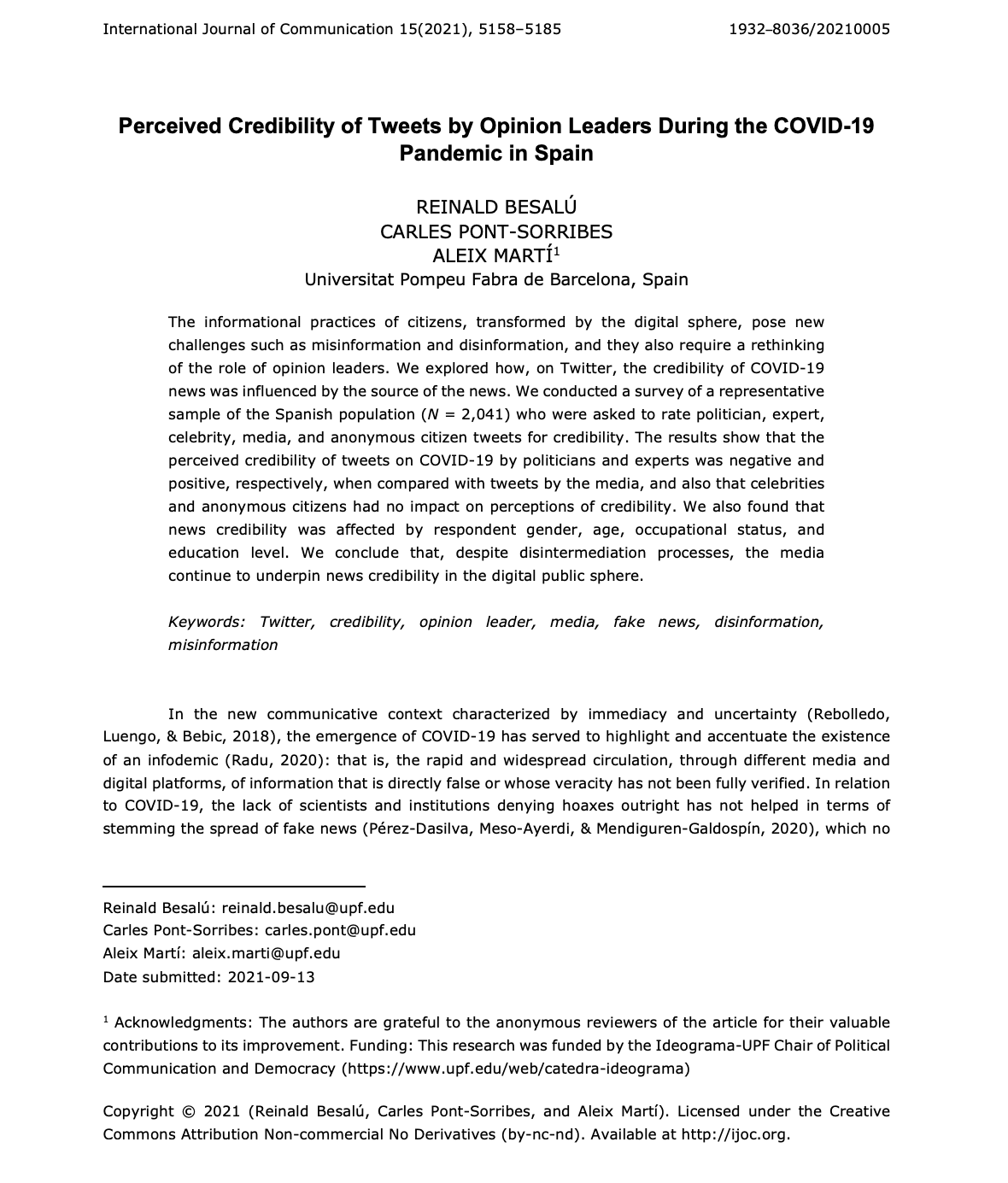 |
Abstract: The informational practices of citizens, transformed by the digital sphere, pose new challenges such as misinformation and disinformation, and they also require a rethinking of the role of opinion leaders. We explored how, on Twitter, the credibility of COVID-19 news was influenced by the source of the news. We conducted a survey of a representative sample of the Spanish population (N = 2,041) who were asked to rate politician, expert, celebrity, media, and anonymous citizen tweets for credibility. The results show that the perceived credibility of tweets on COVID-19 by politicians and experts was negative and positive, respectively, when compared with tweets by the media, and also that celebrities and anonymous citizens had no impact on perceptions of credibility. We also found that news credibility was affected by respondent gender, age, occupational status, and education level. We conclude that, despite disintermediation processes, the media continue to underpin news credibility in the digital public sphere.
Com citar:
Besalú, Reinald, Pont-Sorribes, Carles, & Martí, Aleix. "Perceived Credibility of Tweets by Opinion Leaders During the COVID-19 Pandemic in Spain." International Journal of Communication [Online], 15 (2021): 28. Web. 28 Feb. 2022
Credibility of Digital Political News in Spain: Comparison between Traditional Media and Social Media (2021)
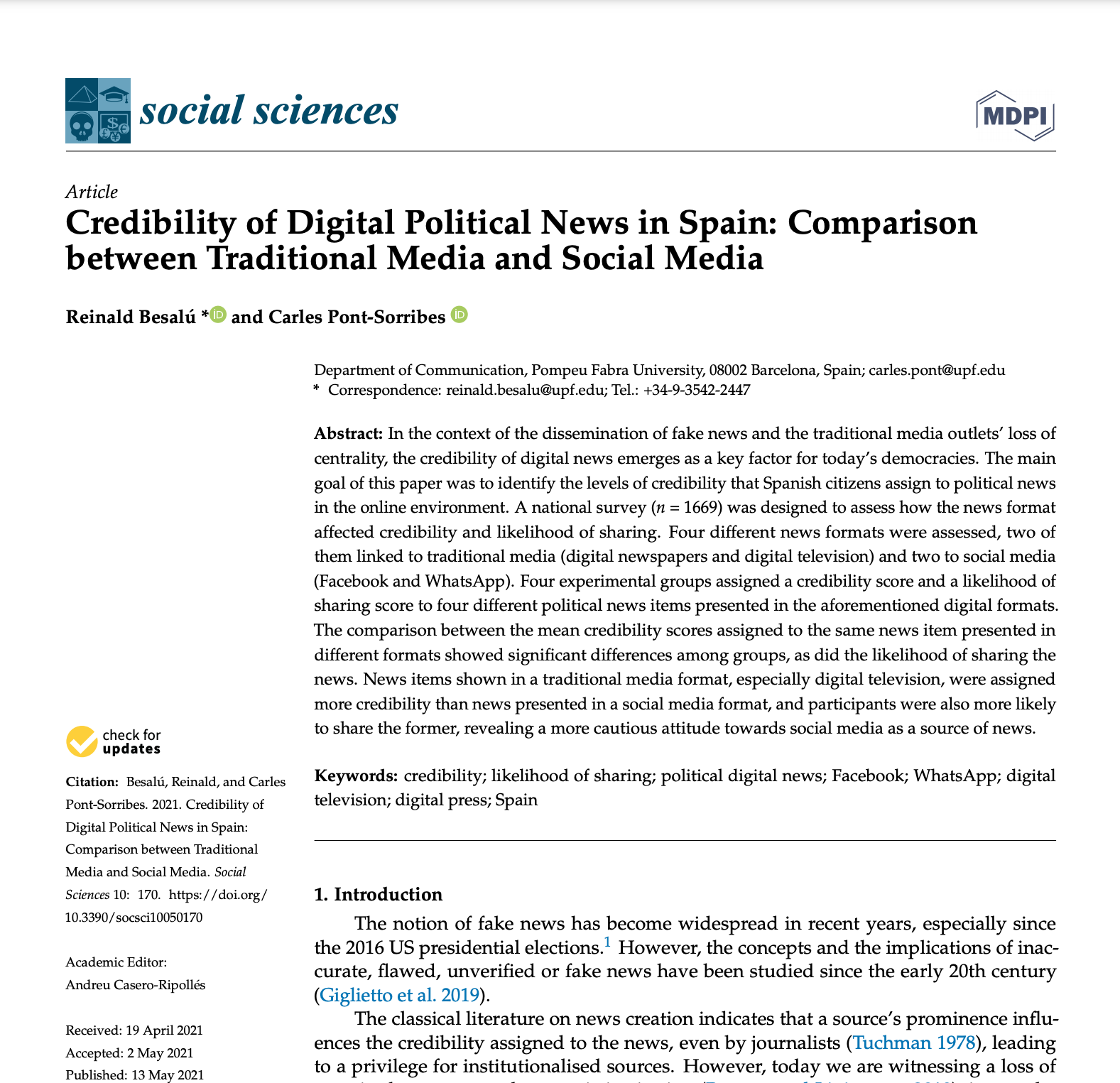 |
Abstract: In the context of the dissemination of fake news and the traditional media outlets’ loss of centrality, the credibility of digital news emerges as a key factor for today’s democracies. The main goal of this paper was to identify the levels of credibility that Spanish citizens assign to political news in the online environment. A national survey (n = 1669) was designed to assess how the news format affected credibility and likelihood of sharing. Four different news formats were assessed, two of them linked to traditional media (digital newspapers and digital television) and two to social media (Facebook and WhatsApp). Four experimental groups assigned a credibility score and a likelihood of sharing score to four different political news items presented in the aforementioned digital formats. The comparison between the mean credibility scores assigned to the same news item presented in different formats showed significant differences among groups, as did the likelihood of sharing the news. News items shown in a traditional media format, especially digital television, were assigned more credibility than news presented in a social media format, and participants were also more likely to share the former, revealing a more cautious attitude towards social media as a source of news.
Com citar:
Besalú, Reinald, and Pont-Sorribes, Carles. 2021. "Credibility of Digital Political News in Spain: Comparison between Traditional Media and Social Media" Social Sciences 10, no. 5: 170.
WhatsApp Com a Eina d’informació política. Pràctiques Desiguals Entre Homes I Dones En l’espai Digital (2020)
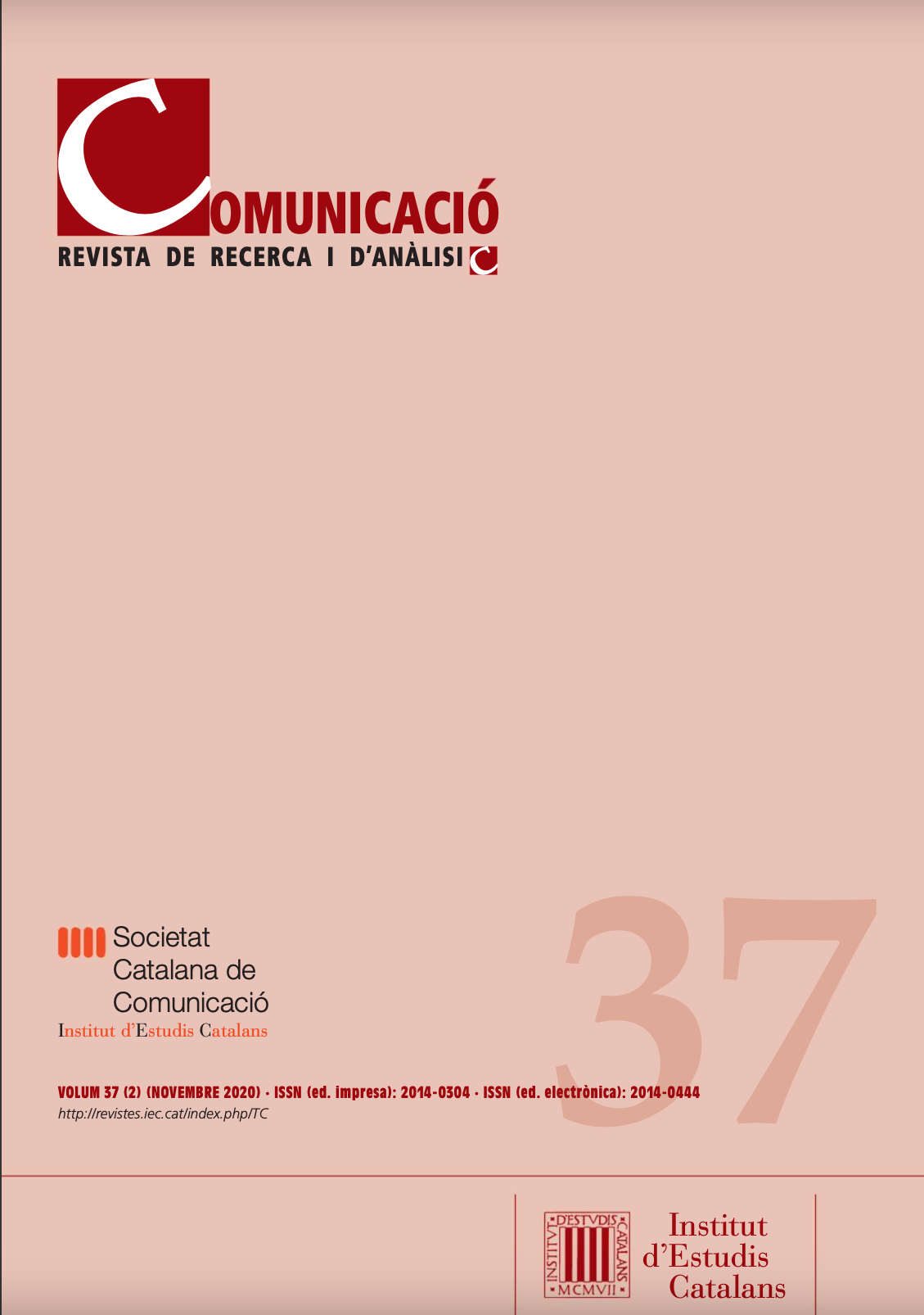 |
Abstract: La imparable penetració i transversalitat que representa WhatsApp en l’entorn digital ha canviat els nostres hàbits comunicatius, per això s’ha convertit en un objecte d’estudi que serveix per a evidenciar que la bretxa digital de gènere no es limita únicament a l’accés a noves tecnologies, sinó també al seu ús. Aquest estudi analitza la bretxa digital des d’una perspectiva de gènere, investigant les pràctiques comunicatives que homes i dones porten a terme per informar-se sobre l’actualitat política a través de WhatsApp. S’empra una metodologia quantitativa centrada en el disseny d’una enquesta aplicada a 1.664 persones a Espanya. L’estudi demostra que els homes reben més informació política a través de WhatsApp que no pas les dones, i, tenint el mateix accés generalitzat a l’ús de l’aplicació, les dones comenten i comparteixen amb menor freqüència que els homes.
Com citar:
Sánchez-Meza, M., B. C. Reinald, P. S. Carles. «WhatsApp Com a Eina d’informació política. Pràctiques Desiguals Entre Homes I Dones En l’espai Digital». Comunicació: Revista De Recerca I d’anàlisi, Vol. 37, Núm. 2, noviembre de 2020, p. 9-31.
WhatsApp como canal de información política en España: credibilidad, perfil de usuarios y compartición de contenidos
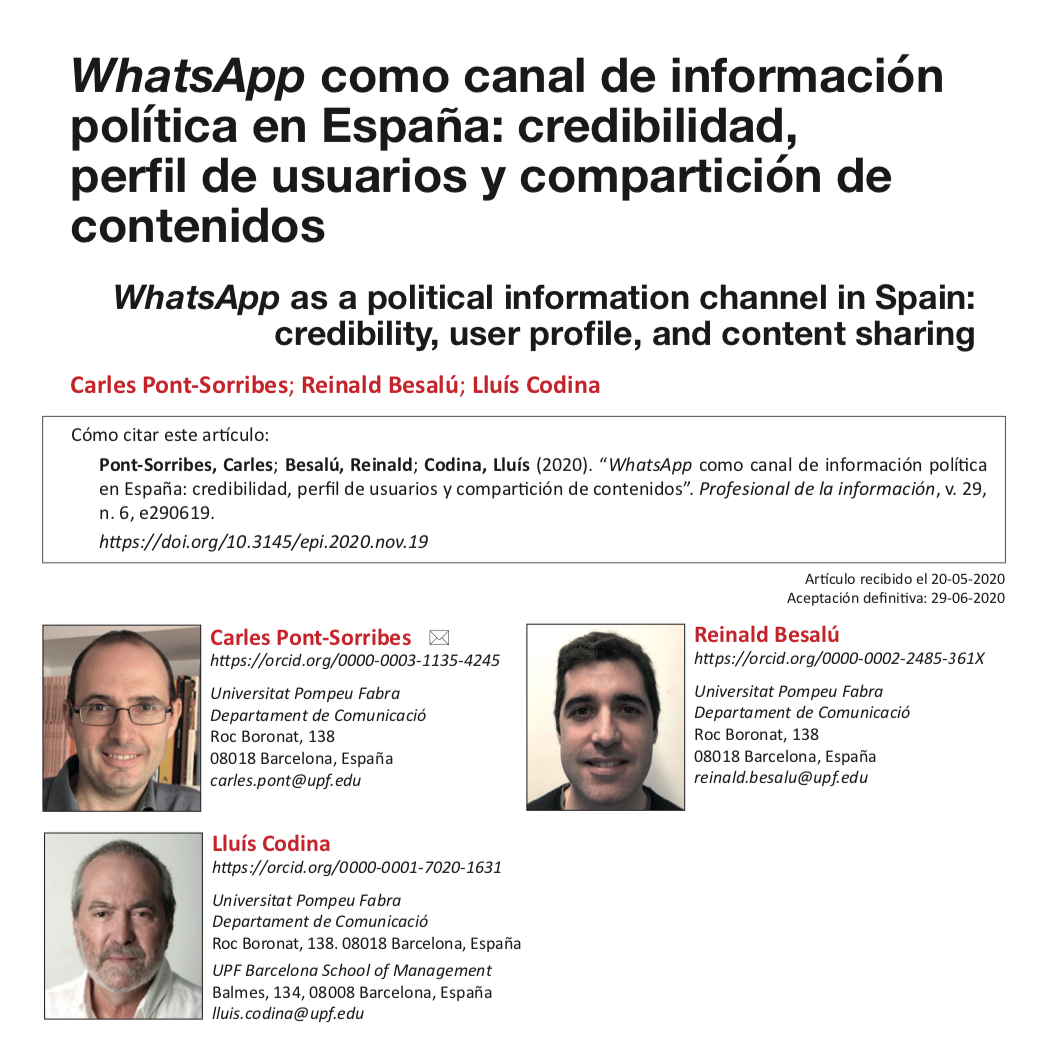 |
Abstract: La mensajería instantánea móvil ha cambiado nuestros hábitos comunicativos, convirtiéndose no sólo en el principal canal de comunicación mediante dispositivos electrónicos, sino también en un nuevo canal a través del que informarse de política y con el que interactuar con los contenidos informativos políticos. Por ello, los objetivos principales de esta investigación son: a) identificar la utilidad que los españoles dan a la plataforma WhatsApp como canal de información política; b) conocer las prácticas de los españoles ante la información política recibida en la plataforma; y c) analizar si la información política es compartida o no en los grupos de la aplicación, así como el grado de credibilidad que le otorgan los ciudadanos. La investigación emplea una metodología cuantitativa centrada en el diseño de una encuesta online con una muestra de 1.669 ciudadanos representativa de la población española, realizada por la empresa de demoscopia YouGov y ponderada por sexo, edad y zona de residencia. La investigación concluye que la mensajería instantánea se ha instalado de forma clara en el ecosistema comunicativo español. Un 64% de los españoles recibe al menos una noticia semanal de actualidad política a través de WhatsApp y un 24% recibe 5 o más noticias por semana.
Com citar:
Pont-Sorribes, Carles; Besalú, Reinald; Codina, Lluís (2020). “WhatsApp como canal de información política en España: credibilidad, perfil de usuarios y compartición de contenidos”. Profesional de la información, v. 29, n. 6, e290619.

